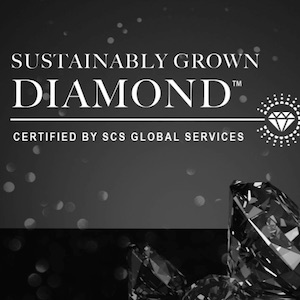
In recent weeks, we have seen several lab-created diamond producers move away from calling themselves “eco-friendly.” That’s largely due to the Federal Trade Commission’s (FTC) warning to lab-grown diamond producers that they should stop using “general benefit environmental claims” like eco-friendly and sustainable, and in part due to a growing cry that companies need to actually prove their eco-friendliness, beyond saying bad things about diamond mines.
At a forum at JCK Las Vegas, two lab-grown diamond sellers—Leon Peres of Green Rocks and Dror Yehuda of Yehuda Diamond Co.—both disavowed that positioning. “I don’t personally think [lab-grown diamonds] are any greener than mined diamonds, and I think it’s a mistake to present them that way,” said Yehuda. “I think it’s BS.” The head of WD Lab Grown similarly declined to wade into the debate in an interview last month. (Others, like Diamond Foundry, still describe their stones as sustainable, despite the FTC warning.)
Given the abiding interest in the topic among consumers, the newly formed Lab-Grown Diamond Council has enlisted SCS Global Services—a certification company that has done work for the Responsible Jewelry Council and Brilliant Earth—to draft and eventually audit a standard that will allow certain diamond growers to call certain products “sustainably grown diamonds.”
This won’t happen overnight, says SCS vice president of corporate sales and marketing Stanley Mathuram—and, in fact, SCS hasn’t finalized its standard yet. That could take several months, he says, but he knows the standard will have three pillars: environment impact, social responsibility, and community benefit.
For the environmental standard, all companies would have to move toward carbon neutrality.
“Companies would be required to benchmark their climate impacts and develop a clear road map to reduction of climate impacts and on the road to meet climate neutrality,” says Mathuram. “The road map will be independently audited and verified.”
Given the large amount of energy utilized to grow diamonds—the diamond-producing machines have to equal the heat and pressure of a volcanic eruption—most companies will have to use at least some carbon offsets.
One diamond grower—Diamond Foundry—has already been certified as carbon neutral by Natural Capital Partners, using solar credits as an offset. But to date there has been little transparency about that certification. (UPDATE: Following publication of this article, Diamond Foundry sent JCK info on its offset projects: they can be seen here and here.)
Mathuram pledges to post all information publicly about how growers fulfill its standard, including how much energy is used, what is matched by offsets, and what offset projects are being funded.
(While it’s beyond the scope of this article, there is a growing controversy about the use of carbon offsets, some fueled by a recent series in ProPublica. Mathuram admits those criticisms have validity but stresses that SCS gets involved only in worthwhile projects, such as an effort to limit black carbon pollution harming the Himalayan watershed.)
In addition, as much as growers fulminate against mining, it’s not exactly a secret that their factories could not be built or run without mined materials. The ecological impact of any mined materials used in a diamond’s production will have to be factored into any environmental assessment, says Mathuram.
The second prong—the social responsibility standard— will include a full audit of the company’s factories and cutters and measure those factories’ wages, working conditions, and whether they have or allow collective bargaining. “The usual assumption is, if you are in North America you eliminate these issues,” he says. “But a lot of these growers are going to be in India and China.”
The third pillar is some kind of community benefit. “Sustainability means nothing if a company just does what’s needed,” says Mathuram. “It is more than just carbon.”
And, of course, every “sustainably grown diamond” would have to be tracked through the supply chain, from the factory to the retailer, using a traceability standard that will go beyond paperwork audits and include testing the diamonds. This may be easier with lab-grown diamonds, which are sometimes produced by a particular “recipe.”
This isn’t about an entire industry declaring itself sustainable, or even comparing one industry to another—which Mathuram says never made much sense to him. It’s about tracking the impact of each company, its processes, and through that, certifying the impact of the resulting diamonds.
Natural diamond miners will soon get a chance to label their gems with a similar phrase—“responsibly mined”—thanks to the work done by the Initiative for Responsible Mining Assurance (IRMA), Mathuram notes. That label could also be used to certify the gold and other mined metals used to create lab-diamond jewelry.

It all seems like a lot of work—and money. “Just like any other certification, the new claim/certification will have a cost associated with assessment, auditing, and traceability,” says Mathuram.
In other words, to truly prove one selling point, lab-grown diamond companies might have to harm their other selling point (their cheaper cost).
But post-FTC, Mathuram feels companies who want to burnish their eco-credentials have no other choice.
“The FTC issue is being listened to by the growers,” Mathuram says. “It goes back to: We can’t just keep saying what we want anymore. It’s not the Wild West and the consumer is getting smarter, and they understand that environmental issues are a big deal, social issues are a big deal, climate issues are a big big deal.
“[The current claims] are unsubstantiated. That’s the key. None of this is substantiated. All we’re saying is we can be the guys that scientifically set the standard. It will be transparent, and you have to audit it. If you don’t do it, don’t make those claims.”
(Images courtesy of SCS Global Services)
- Subscribe to the JCK News Daily
- Subscribe to the JCK Special Report
- Follow JCK on Instagram: @jckmagazine
- Follow JCK on X: @jckmagazine
- Follow JCK on Facebook: @jckmagazine